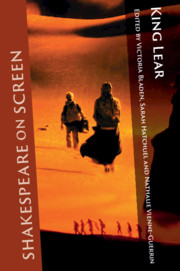Book contents
- Shakespeare on Screen: King Lear
- Series page
- Shakespeare on Screen: King Lear
- Copyright page
- Dedication
- Contents
- Illustrations
- Notes on Contributors
- Series Editors’ Preface
- Acknowledgements
- Chapter 1 Introduction: Dis-locating King Lear on Screen
- Part I Surviving Lear: Revisiting the Canon
- Part II Lear en Abyme: Metatheatre and the Screen
- Part III The Genres of Lear
- Chapter 7 Negotiating Authorship, Genre and Race in King of Texas (2002)
- Chapter 8 Romancing King Lear: Hobson’s Choice, Life Goes On and Beyond
- Chapter 9 ‘Easy Lear’: Harry and Tonto and the American Road Movie
- Part IV Lear on the Loose: Migrations and Appropriations of Lear
- Index
- References
Chapter 7 - Negotiating Authorship, Genre and Race in King of Texas (2002)
from Part III - The Genres of Lear
Published online by Cambridge University Press: 10 September 2019
- Shakespeare on Screen: King Lear
- Series page
- Shakespeare on Screen: King Lear
- Copyright page
- Dedication
- Contents
- Illustrations
- Notes on Contributors
- Series Editors’ Preface
- Acknowledgements
- Chapter 1 Introduction: Dis-locating King Lear on Screen
- Part I Surviving Lear: Revisiting the Canon
- Part II Lear en Abyme: Metatheatre and the Screen
- Part III The Genres of Lear
- Chapter 7 Negotiating Authorship, Genre and Race in King of Texas (2002)
- Chapter 8 Romancing King Lear: Hobson’s Choice, Life Goes On and Beyond
- Chapter 9 ‘Easy Lear’: Harry and Tonto and the American Road Movie
- Part IV Lear on the Loose: Migrations and Appropriations of Lear
- Index
- References
Summary
It might come as a surprise that the American Western adaptation of King Lear should be the product of European collaboration between British Shakespearean actor Patrick Stewart and German director Uli Edel. This contribution tries to show how the adaptation of Shakespeare’s tragedy into King of Texas (2002) is influenced by the problematic relation both to its source, to the chosen setting of the young Republic of Texas and to the cinematographic genre of the Western that the adaptation belongs to. Combining methodologies of source studies and of the theory of adaptation, the chapterexamines the numerous questions that the film raises on three fronts: that of authorship, as the genesis of the film reveals an authorial instability that makes the usual tension between source and target authors even more complex; that of the adaptation itself, namely the transposition of a seventeenth-century play text to a twenty-first-century film whose plot is set in a nineteenth-century Texas; and finally that of the interpretation that replaces or displaces the questioning of royalty and nobility and of the social issues related to birth with new issues of race that find themselves grafted onto the play.
- Type
- Chapter
- Information
- Shakespeare on Screen: King Lear , pp. 111 - 124Publisher: Cambridge University PressPrint publication year: 2019
References
Works Cited
- 1
- Cited by

